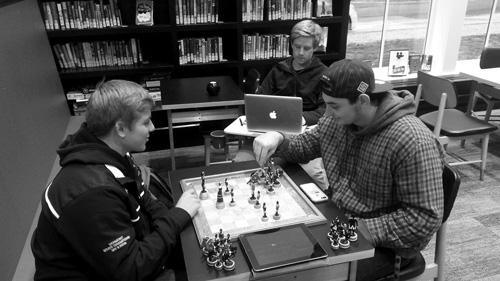News February-March 2015
From ancient Egypt to Vermont
New Manchester library points a way forward for rural communities
 By TELLY HALKIAS
By TELLY HALKIAS
Contributing writer
MANCHESTER, Vt.
More than two millennia have passed since the first of several destructions of the Great Library of Alexandria.
With each catastrophe, the educated world mourned the loss of centuries of knowledge, and the citizens of that ancient Egyptian city decried the absence of their community core.
But each time, knowledge survived and went on to thrive, and the people rebuilt their city’s heart, a magnet that brought them together with travelers from faraway lands.
OK, the town of Manchester didn’t exactly have a historic catastrophe. But it does have its own rebuilt center of knowledge, in the form of the new Manchester Community Library. Far more than just a repository of books, the state-of-the-art structure is the result of years of planning and effort, and it offers what might be a model for the future of similar libraries in smaller communities around the region.
Linda McKeever, a local retailer who is president of the library’s board of trustees, said the decision to go forward with a new facility was born of a need to renovate the former Mark Skinner Library. Shifting town dynamics, she added, demanded action sooner rather than later.
“Our past building at Mark Skinner had been added on to several times in the past but still needed renovation,” McKeever said. “As we began examining that need, it was lost on no one that when the library had been built in 1897, Manchester village was the center of town activity. That’s no longer so today.”
Over the past generation, she explained, with the introduction of more outlet shopping and the current location of Manchester Elementary-Middle School, it had become clear the town had a new focal point – in the area known as Manchester Center.
“It was apparent that if a new library was to be built, it would have to be downtown,” McKeever said.
A new reality
For more than a century, the former Mark Skinner Library was the largest facility of its type in Manchester and 30 surrounding communities. But for most of its life, it was governed and operated as a private concern. In 2003, it made the transition to being a public library, supported by taxpayer funds as well as private donations and endowment distributions.
The new public library’s trustees set out to develop a five-year strategic plan, with extensive community input. That plan, approved in 2006, outlined the necessary benchmarks to attain Manchester’s vision for a premier public “library of the future” -- one that would meet the needs of patrons while also serving as a lively center of civic activity.
The same year the plan was completed, a $2.5 million bequest from longtime local library supporter, the late Jan Hoyt, allowed the trustees to move forward to the next stage of planning. Two independent architectural studies determined renovation of the old library not cost-effective, so the trustees began making plans for a new facility.
Betsy Bleakie, a local businesswoman and former library trustee who took over as the library’s executive director in 2011, helped lead part of the capital campaign that raised nearly $5 million to start the project. The library’s leaders envisioned a first-rate facility, expanded programming and services, and enhanced technology.
“Our trustees continue to review the plan to ensure that the long-range vision reflects future trends, so that we are prepared to make even greater contributions to the region,” Bleakie said. “I can’t overemphasize that. This is more than just a library. It’s a community hub, for residents, for visitors, for workers and for anyone who can benefit from what we offer.”
On the physical side, the new library, which opened in November, offers a town with fewer than 5,000 residents a considerable resource: 14,000 volumes and 18,000 square feet over two levels of multi-functional space, all designed to meet the LEED Silver standard for sustainability set by the U.S. Green Building Council.
The new facility features state-of-the-art computer banks, a children’s area serving three different ages groups and separated from the general collection to allow young children to be noisy, and a Café Commons where people can meet over a cup of java to conduct business or just visit.
Bleakie supervises a staff of seven, augmented by up to 60 volunteers who fill a variety of roles.
“The sense of community is vital here,” Bleakie said. “We are now just two blocks from the elementary and middle school. Kids stop in after school to study, and we have casual space for the young adults to just hang out, too. Parents come by. Groups meet up here. We have spaces available to local businesses and other organizations to meet or conference here. Hub is truly the word to describe our daily density of human activity.”
A model for rural libraries?
In touting some of the new library’s physical trappings, Bleakie implicitly touched upon a less obvious but critical question in the ongoing national discussion on the future of small public libraries. She said in smaller, rural areas, libraries must look for ways to reinvent themselves and forge partnerships that could mean the difference between thriving and just surviving.
Peter Gilbert, executive director of the Vermont Humanities Council, said Vermont has more public libraries per capita than any other state. That statistic, he said, speaks to the vitality of community life in Vermont and its citizens’ interest in books, ideas and community.
“That is in part because Vermont’s population has long lived in villages and towns,” Gilbert said. “Indeed, Vermont’s population is still the most rural of any state in the union, with 62 percent living in towns of fewer than 2,500 people. Our public libraries are priceless civic resources in our communities -- centers of civic engagement, and creators of social capital -- because they bring a wide variety of people together for myriad reasons and programs.”
Gilbert pointed to the humanities council’s reading and discussion programs, now in their 37th year, and its speakers bureau programs, as well as other library services, that he said keep facilities like the Manchester library functioning as busy hubs of their communities.
Bleakie said job and employment services are another way the Manchester library has taken on a new role more than the traditional function of just having tax forms on hand. She noted that the state of Vermont, and most private employers, now require job applications to be completed online. The library can help because not everyone has access to a computer of their own to apply for a position easily.
“We can level the playing field in terms of something like job services,” Bleakie said. “People who might be not be able to afford a computer can come here to apply for these jobs. And it’s not just about our available technology, but also getting search and application assistance from our staff, who are well versed in those subjects. That’s what being a neighbor is all about.”
Portal to the world
In the new library’s first few months, Bleakie has begun to think of the potential use of some of its meeting space for work-force skills enhancement. One possible initiative, she said, could be to offer college distance-learning webinars in partnership with regional institutions of higher learning.
Potential future collaboration with the Community College of Vermont is possible, she added, given that the latter is in the forefront of the distance-learning movement, with about 800 fully online classes per year – and more being added.
Larraby Fellows, a reference and instructional design librarian at the community college’s Hartness Library, previously worked at the Stowe Free Library and served as a trustee of the Kellogg-Hubbard Library in Montpelier. She has also taught courses and assisted student research in the college’s online offerings – the same type of instruction Bleakie mentioned.
Fellows said that as the world of online education grows, the opportunities for Vermont’s public libraries will too.
“Public libraries have always had community space for town governance meetings and educational lectures, but we’re now seeing them use technology to expand the reach of the community,” Fellows said. “Some libraries have designated computers or stations for video conferencing, webinars, distance education, and a few are even offering private places for patrons to do things like use Skype for a job interview.”
Fellows said for rural areas in particular, public libraries with this type of technology can offer patrons a chance “to join a global conversation, keep up with skills needed in the 21st century work force, or simply offer help connecting to grandchildren through a webcam.
“Libraries have always been community centers,” he added. “But our community today reaches across the globe.”
McKeever, perhaps sounding more like a citizen of ancient Alexandria after rebuilding the Great Library from its ruins, she said that now that the new library is up and running, the real work begins.
“Manchester and its surrounding town are beginning to see what an asset this new type of library will be in the coming years,” she said. “Betsy and her staff and volunteers are rendering priceless community service every day, and we’re just scratching the surface of the building’s potential. There’s also pride in the energy and sprit coming from it -- and from our citizens. This library is uniting people, and in the end, it’s a place defined by those who make its value real.”
The new Manchester Community Library is at 138 Cemetery Ave., just off Route 7A in Manchester Center. For more information, visit www.mclvt.org or call (802) 362-2607.

